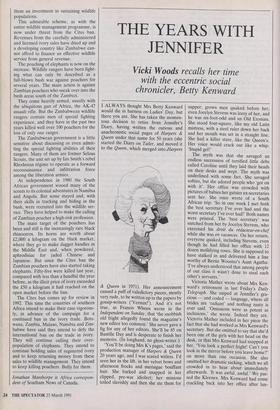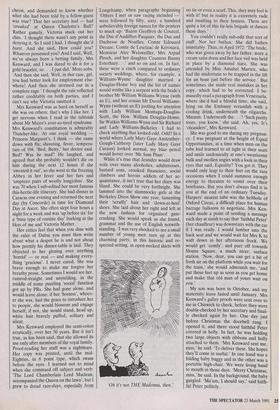THE YEARS WITH JENNIFER
Vicki Woods recalls her time
with the eccentric social chronicler, Betty Kenward
I ALWAYS thought Mrs Betty Kenward would die in harness on Ladies' Day, but there you are. She has taken the momen- tous decision to retire from Jennifer's Diary, having written the curious and anachronistic social pages of Harpers & Queen under that name for 50 years (she started the Diary on Taller, and moved it to the Queen, which merged into .Harpers & Queen in 1971). Her announcement caused a puff of valedictory pieces, mostly very rude, to be written up in the papers by gossip-writers ('Vermin!'). And it's not true, as Francis Wheen wrote in the Independent on Sunday, that 'the snobbish old fright allegedly found the magazine's new editor too common.' She never gave a fig for any of her editors. She'll be 85 on Bastille Day and is desperate to finish her memoirs. (In longhand, no ghost-writer.) 'You'll be doing Mrs K's pages,' said the production manager of Harpers & Queen 20 years ago, and I was scared witless. I'd seen her in the lift, in her velvet bows and afternoon frocks and meringue bouffant hair. She barked and snapped in her clipped, pre-war idiolect; her minions toiled slavishly and then she ate them for supper; grown men quaked before her; even Jocelyn Stevens was leery of her, and he was six-foot-odd and an Old Etonian. She stood four-square, like my old Latin mistress, with a steel ruler down her back and her mouth was set in a straight line. She had a killer stare, like the Queen's. Her voice would crack out like a whip. 'Stupid gel!'
The myth was that she savaged an endless succession of terrified little debs called Caroline until they laid their heads on their desks and wept. The myth was underlined with some fact. She savaged softies, but she adored people who 'got on with it'. Her office was crowded with pictures of babies her gutsier ex-secretaries sent her. She once wrote of a South African trip: 'So in one week I met both the best secretary I've ever had and the worst secretary I've ever had!' Both names were printed. The 'best secretary' was snitched from her by Jocelyn Stevens, who exercised his droit du reclacteur-en-chef while she was en vacances. On her return, everyone quaked, including Stevens, even though he had filled her office with 12 dozen mollifying roses. She is supposed to have stalked in and delivered him a line worthy of Bertie Wooster's Aunt Agatha: 'I've always understood that among people of our class it wasn't done to steal each other's servants.'
Victoria Mather wrote about Mrs Ken- ward's retirement in last Friday's Daily Telegraph. She sniped at Jennifer's gra- cious — and coded — language, where all brides are 'radiant' and nothing nasty is ever said. 'Omissions were as potent as inclusions,' she wrote. Indeed they are. Victoria Mather included in her piece the fact that she had worked as Mrs Kenward's secretary. But she omitted to say that she'd been one of the girls with her head on the desk, or that Mrs Kenward had snapped at her, 'You look a perfect fright! Can't you look in the mirror before you leave home?' on more than one occasion. She also omitted her dramatic sacking, which we all crowded in to hear about immediately afterwards. 'It was awful, awful.' We pas- sed the Kleenex. Mrs Kenward had come crackling back into her office after lun- cheon, and demanded to know whether what she had been told by a fellow-guest was true? That her secretary had — had 'streaked' at Queen Charlotte's Ball? Rather gamely, Victoria stuck out her chin. 'I thought there wasn't any point in denying it. So I said I had. I thought she'd burst. And she said, How could you? Whatever possessed you? And I said, Well, we've always been a betting family, Mrs Kenward, and I was dared to do it for a gold bracelet, so. . . I just did.' More sobs. 'And then she said, Well, in that case, gel, you had better look for employment else- where! And then she stormed out in a complete rage.' I thought the tale reflected rather creditably on both parties, and I can't see why Victoria omitted it.
Mrs Kenward was as hard on herself as she was on others: that's why I like her. I get nervous when I read in the tabloids about Mr Major's ever-so-tired syndrome. Mrs Kenward's constitution is admirably Thatcher-like. At one royal wedding — Princess Margaret's, I think — she came down with flu; shivering, fever, tempera- ture of 104. 'Bed, Betty,' her doctor said. Bed? Was he mad? He laughed, and agreed that she probably wouldn't die on him during the next 12 hours if she 'sweated it out', so she went to the freezing Abbey in her fever and her furs and 'umpteen pairs of woolly longjohns'. She was 70 when I sub-edited her most famous this-hectic-life itinerary. She had dinner in Caracas one evening and returned the next day (by Concorde) in time for Diamond Day at Ascot. She often slept four hours a night for a week and was 'up before six' for a 'busy type of routine day' barking at the likes of me and Victoria Mather.
Her critics feel that when you dine with the ruler of Dubai you must then write about what a despot he is and not about how prettily his dinner-table is laid. They objected to her glozing over anything 'horrid' — or real — and making every- thing 'gracious'. I never cared. She was brave enough to make me forgive her breathy prose. Sometimes I would see her, ramrod-straight and unyielding, in the middle of some puzzling 'social' function got up by PRs. She had gone alone, and would leave alone: if her 'hostess', whoev- er she was, had the grace to introduce her to people, she would blossom and engage herself; if not, she would stand, head up, white hair bravely puffed, solitary and silent.
Mrs Kenward employed the semi-colon erratically, over her 50 years. But it isn't true, as has been said, that she allowed its use only after members of the royal family. Proof-reading her stuff was a nightmare. Her copy was printed, until the mid- Eighties, in 8 point type, which swam before the eyes. I learned not to mind when she commaed off subject and verb: 'The Lord Chamberlain Lord Maclean, accompanied the Queen on the lawn', but I grew to dread race-days, especially from Longchamp, when paragraphs beginning 'Others I met or saw racing included —' were followed by fifty, sixty, a hundred unbelievably foreign names for the printers to muck up: 'Baron Geoffroy de Courcel, the Duc d'Audiffret-Pasquier, the Duc and Duchesse de Noailles, Comte Edouard Decaze, Comte de Leselauc de Kerouara, Monsieur Alec Weisweiller, Mrs Arpad Plesch, and her daughter Countess Bunny Esterhazy. . .' and so on and on. In fact, these were a cinch compared to ordinary society weddings, where, for example, a Williams-Wynne daughter married a Douglas-Home boy and the list of names would writhe like a serpent with the bride's brother Mr William Williams-Wynne (with an E), and her cousin Mr David Williams- Wynn (without an E) jostling for attention with Lady William Montagu-Douglas- Scott, the Hon. William Douglas-Home, Sir Watkin Williams-Wynn and Sir Richard and Lady Williams-Bulkeley. I had to check anything that looked odd. Odd? In a world where Lady Mary Gaye Anstruther- Gough-Calthorp (later Lady Mary Gaye Curzon) looked normal, my blue pencil would hover over 'Mr Sam Plum'.
While it's true that Jennifer would draw veils over many alcoholics, adulteresses, bastard sons, crooked financiers, social climbers and heroin addicts of her ac- quaintance, it isn't true that her diary was bland. She could be very forthright. She lammed into the slummocky girls at the Berkeley Dress Show one year, lamenting their 'scruffy' hair and 'down-at-heel' shoes. She laid about her right and left at the new fashion for organised gate- crashing. She would speak as she found, grammar and the use of English notwith- standing. 'I was very shocked to see a small number of young men turn up at this charming party, in this historic and re- spected setting, in open-necked shirts with 'Oh it's not THE Madonna, then.' no tie or even a scarf. This, they may feel is with it! but in reality it is extremely rude and insulting to their hostess. There are quite a lot of this tie-less brigade at dances these days.'
You couldn't really sub-edit that sort of stuff. Nor her bathos. She did bathos inimitably. Thus, in April 1972: The bride, who was given away by her father, wore a cream satin dress and her lace veil was held in place by a diamond tiara. She was attended by Miss Amabel Marten, who had the misfortune to be trapped in the lift for an hour just before the service.' But sometimes she made real mistakes in her copy, which had to be corrected. I be- musedly read a paragraph from Venezuela, where she'd had a blissful time, she said, lying on the Embassy verandah with a cooling drink, underneath the oligarchs. Mmmm. Underneath the. . .? 'Such pretty trees, you know,' she said. Ah, yes. It's 'oleanders', Mrs Kenward.
She was good to me during my pregnan- cy. I was pregnant at the height of Equal Opportunities, at a time when men on the tube had learned to sit tight in their seats and smile sardonically at one's wearisome bulk and swollen angles with a look in their eyes that said, Equality? You got it. They would only leap to their feet on the rare occasions when I could summon enough energy to threaten to vomit over their briefcases. But you don't always find it in you at the end of an ordinary Tuesday. Harpers' nearest tube was the hellhole of Oxford Circus, a difficult place for human barrage balloons to negotiate. Mrs Ken- ward made a point of sending a message each day at sixish to say that 'faithful Peter' (her chauffeur) was downstairs with the car if I was ready. I would lumber into the back seat and we would wait for Mrs K to waft down in her afternoon frock. We would get 'comfy', and purr off towards Sloane Square, a much nicer, surface station. 'Now, dear, you can get a bit of fresh air on the platform while you wait for the train,' she would admonish me, 'and put those feet up as soon as you get home and make that old man of yours wait on you.'
My son was born in October, and my maternity leave lasted until January. Mrs Kenward's galley proofs were sent over to me in Chiswick to check, before they were double-checked by her secretary and final- ly checked again by her. One day just before Christmas the doorbell rang. I opened it, and there stood faithful Peter covered in holly. In fact, he was holding two large objects with ribbons and holly attached to them. 'Mrs Kenward sent me, miss,' he said. 'To deliver these. She hopes they'll come in useful.' In one hand was a folding baby buggy and in the other was a portable high-chair. We were living hand to mouth in those days. 'Merry Christmas, miss,' he said. In the background, the baby gurgled. 'Ma'am, I should say,' said faith- ful Peter politely.



























































 Previous page
Previous page